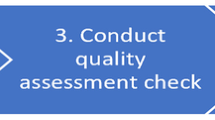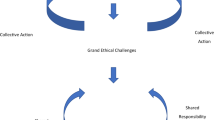Abstract
Our digital age is characterized by both a generalized access to data and an increased call for participation of the public and other stakeholders and communities in policy design and decision-making. This context raises new challenges for political decision-makers and analysts in providing these actors with new means and moral duties for decision support, including in the area of environmental policy. The concept of “policy analytics” was introduced in 2013 as an attempt to develop a framework, tools, and methods to address these challenges. This conceptual initiative prompted numerous research teams to develop empirical applications of this framework and to reflect on their own decision-support practice at the science-policy interface in various environmental domains around the world. During a workshop in Paris in 2018, participants shared and discussed their experiences of these applications and practices. In this paper, we present and analyze a set of applications to identify a series of key properties that underpin a policy analytics approach, in order to provide the conceptual foundation for policy analytics to address current policy design and decision-making challenges. The induced properties are demand-orientedness, performativity, normative transparency, and data meaningfulness. We show how these properties materialized through these six case studies, and we explain why we consider them key to effective policy analytics applications, particularly in environmental policy design and decision-making on environmental issues. This clarification of the policy analytics concept eventually enables us to highlight research frontiers to further improve the concept.
Similar content being viewed by others
References
Arts I, Buijs AE, Verschoor G (2017) Regimes of justification: competing arguments and the construction of legitimacy in Dutch nature conservation practices. J Environ Plan Manag 61(5–6):1070–1084
Azibi R, Vanderpooten D (2002) Construction of rule-based assignment models. Eur J Oper Res 138(2):274–293
Boschet C, Rambonilaza T (2017) Collaborative environmental governance and transaction costs in partnerships: evidence from a social network approach to water management in France. J Environ Plann Man 61:105–123. https://doi.org/10.1080/09640568.2017.1290589
Boyd A, Geerling T, Gregory WJ, Kagan C, Midgley G, Murray P, Walsh MP (2007) Systemic evaluation: a participative, multi-method approach. J Oper Res Soc 58:1306–1320
Cailloux O, Meinard Y (2019) A formal framework for deliberated judgment. Theor Decis. https://doi.org/10.1007/s11238-019-09722-7
Choulak M, Marage D, Gisbert M, Paris M, Meinard Y (2019) A meta-decision-analysis approach to structure operational and legitimate environmental policies—with an application to wetland prioritization. Sci Total Environ 655:384–394. https://doi.org/10.1016/j.scitotenv.2018.11.202
Christophides V, Efthymiou V, Palpanas T, Papadakis G, Stefanidis K (2019) End-to-end entity resolution for big data: a survey. CoRR.https://arxiv.org/abs/1905.06397
Daniell KA (2012) Co-engineering and participatory water management: organisational challenges for water governance. Cambridge University Press, Cambridge UK.
Daniell KA, Mazri C, Tsoukiàs A (2010) Real world decision-aiding: a case of participatory water management. In: French S, Rios-Insua D (eds) e-Democracy: a group decision and negotiation perspective. Springer-Verlag, Berlin, p 125–150
Daniell KA, Morton A, Ríos, Insua D (2015) Policy analysis and policy analytics. Ann Oper Res 236:1–13. https://doi.org/10.1007/s10479-015-1902-9
Department of Industry, Innovation and Science (DIIS) (2018) Australia’s tech future. Department of Industry, Innovation and Science. Canberra. https://www.industry.gov.au/sites/default/files/2018-12/australias-tech-future.pdf. Accessed 8 Mar 2019
Devictor V, Bensaude-Vincent B (2016) From ecological records to big data: the invention of global biodiversity. HLPS 38:13
Federal Data Strategy (2019) The Federal Data Strategy. https://strategy.data.gov/. Accessed 8 Mar 2019
Federal Ministry for Economic Affairs and Energy (FMEAE) (2018) Digital Strategy 2025. Federal Ministry for Economic Affairs and Energy. https://www.de.digital/DIGITAL/Redaktion/EN/Publikation/digital-strategy-2025.pdf?__blob=publicationFile&v=9. Accessed 6 Mar 2019
Ferretti V, Pluchinotta I, Tsoukiàs A (2018) Supporting decisions in public policy making processes: generation of alternatives and innovation. Eur J Oper Res 273:353–363. https://doi.org/10.1016/j.ejor.2018.07.054
Giordano R, Brugnach M, Pluchinotta I (2017) Ambiguity in problem framing as a barrier to collective actions: some hints from groundwater protection policy in the Apulia Region Group. Decis Negot 26:911–932. https://doi.org/10.1007/s10726-016-9519-1
Giordano R, D’Agostino D, Apollonio C, Scardigno A, Pagano A, Portoghese I, Lamaddalena N, Piccinni AF, Vurro M (2015) Evaluating acceptability of groundwater protection measures under different agricultural policies. Agr Water Manag 147:54–66. https://doi.org/10.1016/j.agwat.2014.07.023
Giordano R, Pluchinotta I, Zikos D, Krueger T, Tsoukiàs A (2020) How to use ambiguity in problem framing for enabling divergent thinking: integrating problem structuring methods and concept-knowledge theory. In: White L, Kunc M, Malpass J, Burger K (eds) Behavioral operational research: a capabilities approach. Palgrave Macmillan Publishers, Basingstoke, UK, p 93–117
Habermas J (1985) The theory of communicative action. Beacon Press, Boston
Habermas J (1990) The philosophical discourse of modernity. MIT Press
Hamilton SH, Fu B, Guillaume JHA, Badham J, Elsawah S, Gober P, Hunt RJ, Iwanaga T, Jakeman AJ, Ames DP, Curtis A, Hill MC, Pierce SA, Zare F (2019) A framework for characterising and evaluating the effectiveness of environmental modelling. Environ Model Softw 118:89–98. https://doi.org/10.1016/j.envsoft.2019.04.008
Howlett M (2011) Designing public policies: principles and instruments. Routledge, London
Jakeman AJ, Letcher RA, Norton JP (2006) Ten iterative steps in development and evaluation of environmental models. Environ Model Softw 21:602–614. https://doi.org/10.1016/j.envsoft.2006.01.004
Jaric I, Quétier F, Meinard Y (2019) Procrustean beds and empty boxes: on the magic of creating environmental data. Biol Conserv 237:248–252
Jeanmougin M, Dehais C, Meinard Y (2017) Mismatch between habitat science and habitat directive: lessons from the French (counter-)example. Conserv Lett 10:634–644
Johnson BD (2011) Science fiction prototyping: designing the future with science fiction. Morgan & Claypool Publishers, San Francisco
Johnston EW (ed) (2015) Governance in the information era: theory and practice of policy informatics. Routledge, New York
Kana V, Somé B, Tsoukiàs A (2014) A new methodology for multidimensional poverty measurement based on the capability approach. Socio-Economic Plan Sci 48:273–289. https://doi.org/10.1016/j.seps.2014.04.002
Kelly RA, Jakeman AJ, Barreteau O, Borsuk ME, ElSawah S, Hamilton SH, Henriksen HJ, Kuikka S, Maier HR, Rizzoli AE, van Delden H, Voinov AA (2013) Selecting among five common modelling approaches for integrated environmental assessment and management. Environ Model Softw 47:159–181
Lahtinen TJ, Guillaume JHA, Hämäläinen RP (2017) Why pay attention to paths in the practice of environmental modelling? Environ Model Softw 92:74–81. https://doi.org/10.1016/j.envsoft.2017.02.019
Lazer D, Pentland A, Adamic L, Aral S, Barabási AL, Brewer D, Christakis N, Contractor N, Fowler J, Gutmann M, Jebara T (2009) Computational social science. Science 323(5915):721–723
Leroy A, Mousseau V, Pirlot M (2011) Learning the parameters of a multiple criteria sorting method. In: Brafman R, Roberts F, Tsoukias A (eds.). Algorithmic decision theory. Lecture notes in artificial intelligence, vol. 6992. Springer, Berlin, Heidelberg, p 219–233
Löfgren K, Webster CWR (2020) The value of Big Data in government: the case of ‘smart cities’. Big Data Soc 7(1). https://doi.org/10.1177/2053951720912775
Long C (2019) An uncomfortable time to be in politics (or anywhere with a ‘climate’). The New Matilda, December 12. https://newmatilda.com/2019/12/12/an-uncomfortable-time-to-be-in-politics-or-anywhere-with-a-climate/
Maier HR, Guillaume JHA, van Delden H, Riddell GA, Haasnoot M, Kwakkel JH (2016) An uncertain future, deep uncertainty, scenarios, robustness and adaptation: how do they fit together? Environ Model Softw 81:154–164. https://doi.org/10.1016/j.envsoft.2016.03.014
Mazri C, Daniell KA, Tsoukiàs A (2019) Decision support in participative contexts: the organisational design dimension. Int J Decis Support Syst Technol 11:47–80
Meinard Y (2017) What is a legitimate conservation policy? Biol Conserv 2013:115–123
Meinard Y, Tsoukias A (2019) On the rationality of decision aiding processes. Eur J Operational Res 273(3):1074–1084. https://doi.org/10.1016/j.ejor.2018.0
Merritt WS, Fu B, Ticehurst JL, El Sawah S, Vigiak O, Roberts AM, Dyer F, Pollino CA, Guillaume JHA, Croke BFW, Jakeman AJ (2017) Realizing modelling outcomes: a synthesis of success factors and their use in a retrospective analysis of 15 Australian Water Resource Projects. Environ Model Softw 94:63–72. https://doi.org/10.1016/j.envsoft.2017.03.021
Mergel I, Rethemeyer RK, Isett K (2016) Big data in public affairs. Public Admin Rev 76(6):928–937
Midgley G (2006) Systems thinking for evaluation. In: Williams B, Imam I (eds) Systems concepts in evaluation: an expert anthology. Edge Press, Point Reyes, p 11–34
Nabatchi T (2012) Putting the “public” back in public values research: designing participation to identify and respond to values. Public Adm Rev 72(5):699–708
O’Donnell EL, Horne AC, Godden L, Head B (2019) Cry me a river: building trust and maintaining legitimacy in environmental flows. Australas J Water Resour 23:1–13. https://doi.org/10.1080/13241583.2019.1586058
Ostanello A, Tsoukiàs A (1993) An explicative model of ‘public’ interorganizational interactions. Eur J Oper Res 70:67–82
Patton MQ (2008) Utilization-focused evaluation. Sage publications, London
Peirce CS (1966) Selected writings. Dover Publications, Mineola
Pluchinotta I, Pagano A, Giordano R, Tsoukiàs A (2018) A system dynamics model for supporting decision makers in irrigation water management. J Environ Manag 223:815–824. https://doi.org/10.1016/j.jenvman.2018.06.083
Pluchinotta I, Kazakçi AO, Giordano R, Tsoukiàs A (2019) Design theory for generating alternatives in public policy making. Group Decis Negot 28:341–375
Portoghese I, Agostino D. D, Agostino R, Giordano R, Scardigno A, Apollonio C, Vurro M (2013) An integrated modelling tool to evaluate the acceptability of irrigation constraint measures for groundwater protection Environ Model Softw 46:90–103
Raboun O, Chojnacki E, Duffa C, Rios-Insua D, Tsoukiàs A (2019) Spatial risk assessment in case of multiple nuclear release scenarios. Socio-Economic Plan Sci 72:2019. https://doi.org/10.1016/j.seps.2019.06.006
Rahwan I, Simari GR (eds) (2009) Argumentation in artificial intelligence. Springer, Dordrecht, New York
Richard A, Mayag B, Meinard Y, Talbot F, Tsoukiàs A (2018) How AI could help physicians during their medical consultations: an analysis of physicians’ decision process to develop efficient decision support systems for medical consultations. In: PFIA 2018, Nancy, France
Scott JC (1998) Seeing like a State. Yale University Press, New Haven
The White House (2019) Executive order on maintaining American leadership in artificial intelligence. The White House. https://www.whitehouse.gov/presidential-actions/executive-order-maintaining-american-leadership-artificial-intelligence/. Accessed 8 Mar 2019
Touret R, Meinard Y, Petit J-C, Tsoukias A (2019) Cartographie descriptive du système national français du financement de la recherche sur projet en vue de son évaluation. Innovations 59:205–241
Tsoukias A, Montibeller G, Lucertini G, Belton V (2013) Policy analytics: an agenda for research and practice. EURO J Decis Process 1:115–134
Villani C (2018) For a meaningful artificial intelligence: towards a French and European Strategy. Government of France. https://www.aiforhumanity.fr/pdfs/MissionVillani_Report_ENG-VF.pdf. Accessed 6 Mar 2019
Webster G, Creemers R, Triolo P, Kania E (2019) Full translation: China’s ‘New Generation Artificial Intelligence Development Plan’ (2017). New America. https://www.newamerica.org/cybersecurity-initiative/digichina/blog/full-translation-chinas-new-generation-artificial-intelligence-development-plan-2017/. Accessed 9 Mar 2019
Wenger A, Dunn Cavelty M, Jasper U (2020) The politics and science of the future: assembling future knowledge and integrating it into public policy and governance. In: Wenger A, Jasper U, Dunn Cavelty M (eds) The politics and science of prevision: governing and probing the future. Routledge, Abingdon, New York, p 229–251
Acknowledgements
This collaborative research was supported by a Grant from the ANU Global Research Partnerships Scheme, and two EU Erasmus+ Jean Monnet projects, the “Europa Policy Labs” and the “Water Policy Innovation Hub”.
Author information
Authors and Affiliations
Corresponding author
Ethics declarations
Conflict of Interest
The authors declare that they have no conflict of interest.
Additional information
Publisher’s note Springer Nature remains neutral with regard to jurisdictional claims in published maps and institutional affiliations.
Rights and permissions
About this article
Cite this article
Meinard, Y., Barreteau, O., Boschet, C. et al. What is Policy Analytics? An Exploration of 5 Years of Environmental Management Applications. Environmental Management 67, 886–900 (2021). https://doi.org/10.1007/s00267-020-01408-z
Received:
Accepted:
Published:
Issue Date:
DOI: https://doi.org/10.1007/s00267-020-01408-z




